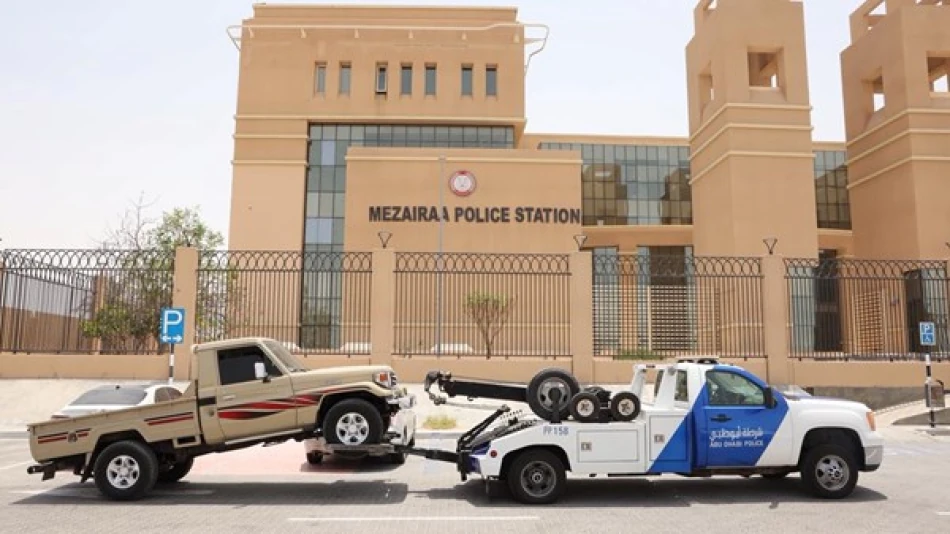
Abu Dhabi Police Apprehend Reckless Drivers Endangering Roads
Abu Dhabi Police Crack Down on Reckless Driving as Youth Street Racing Threatens Road Safety
Abu Dhabi police have arrested multiple drivers in the Al Dhafra region for dangerous driving violations including street racing, evading traffic officers, and operating vehicles without license plates. The coordinated operation highlights escalating concerns over youth reckless driving behaviors that authorities say are contributing to serious traffic accidents across the emirate.
Coordinated Enforcement Operation Targets Dangerous Drivers
The Traffic and Security Patrols Department in Al Dhafra region, working alongside the Special Patrols Department, conducted targeted operations in Liwa to apprehend drivers engaging in what officials described as "uncivilized behavior" that endangered both perpetrators and other road users.
The violations included dangerous vehicle exhibitions, fleeing from traffic police, and driving unregistered vehicles on public roads. These incidents represent a broader pattern of risky driving behaviors that have become increasingly problematic in the UAE's rapidly growing urban centers.
Official Response Emphasizes Zero Tolerance Policy
Senior Leadership Takes Direct Action
Brigadier Mohammed Dhahi Al Himiri, Director of the Central Operations Sector at Abu Dhabi Police, emphasized the professional and rapid response of field teams to reports of dangerous driving. He confirmed that all necessary legal procedures have been initiated against the violators, reinforcing the emirate's commitment to road safety enforcement.
"Reckless driving behaviors are among the most prominent causes of serious traffic accidents," Al Himiri stated, underlining the direct connection between enforcement actions and public safety outcomes.
Targeting Youth Demographics
The operation specifically addressed concerns about young drivers, with authorities urging this demographic to comply with traffic rules and avoid reckless behaviors. This focus reflects similar challenges faced by law enforcement agencies across the Gulf region, where rapid economic growth and increased vehicle ownership have coincided with rising traffic safety concerns.
Broader Implications for UAE's Road Safety Strategy
Regional Context and Enforcement Trends
The Abu Dhabi crackdown aligns with broader regional efforts to address traffic safety challenges. The UAE has implemented increasingly sophisticated traffic monitoring systems and penalty structures as part of its Vision 2071 strategy, which includes ambitious road safety targets.
Similar enforcement operations have been conducted across other emirates, suggesting a coordinated national approach to addressing what officials describe as an emerging public safety crisis. The emphasis on youth education and parental responsibility reflects lessons learned from traffic safety campaigns in countries like Singapore and South Korea.
Community Engagement and Prevention
Brigadier Mahmoud Youssef Al Balushi, Director of the Traffic and Security Patrols Directorate, called on parents to monitor their children's driving behaviors and guide them toward safe and responsible vehicle use. This community-based approach represents a shift from purely punitive measures toward preventive strategies.
The police have established reporting mechanisms for dangerous driving, including the Aman service at 8002626 and SMS reporting at 2828, creating multiple channels for public participation in traffic safety enforcement.
Long-term Strategy and Future Outlook
Abu Dhabi Police confirmed the continuation of joint field campaigns and intensive monitoring of roads and vital areas as part of a proactive approach to protecting lives and property. This sustained enforcement strategy suggests authorities view the current situation as requiring long-term intervention rather than isolated crackdowns.
The integration of community reporting, parental responsibility, and professional enforcement represents a comprehensive approach that could serve as a model for other rapidly developing urban areas facing similar challenges. The success of these measures will likely influence traffic safety policies across the broader Gulf Cooperation Council region.
Most Viewed News

 Layla Al Mansoori
Layla Al Mansoori






